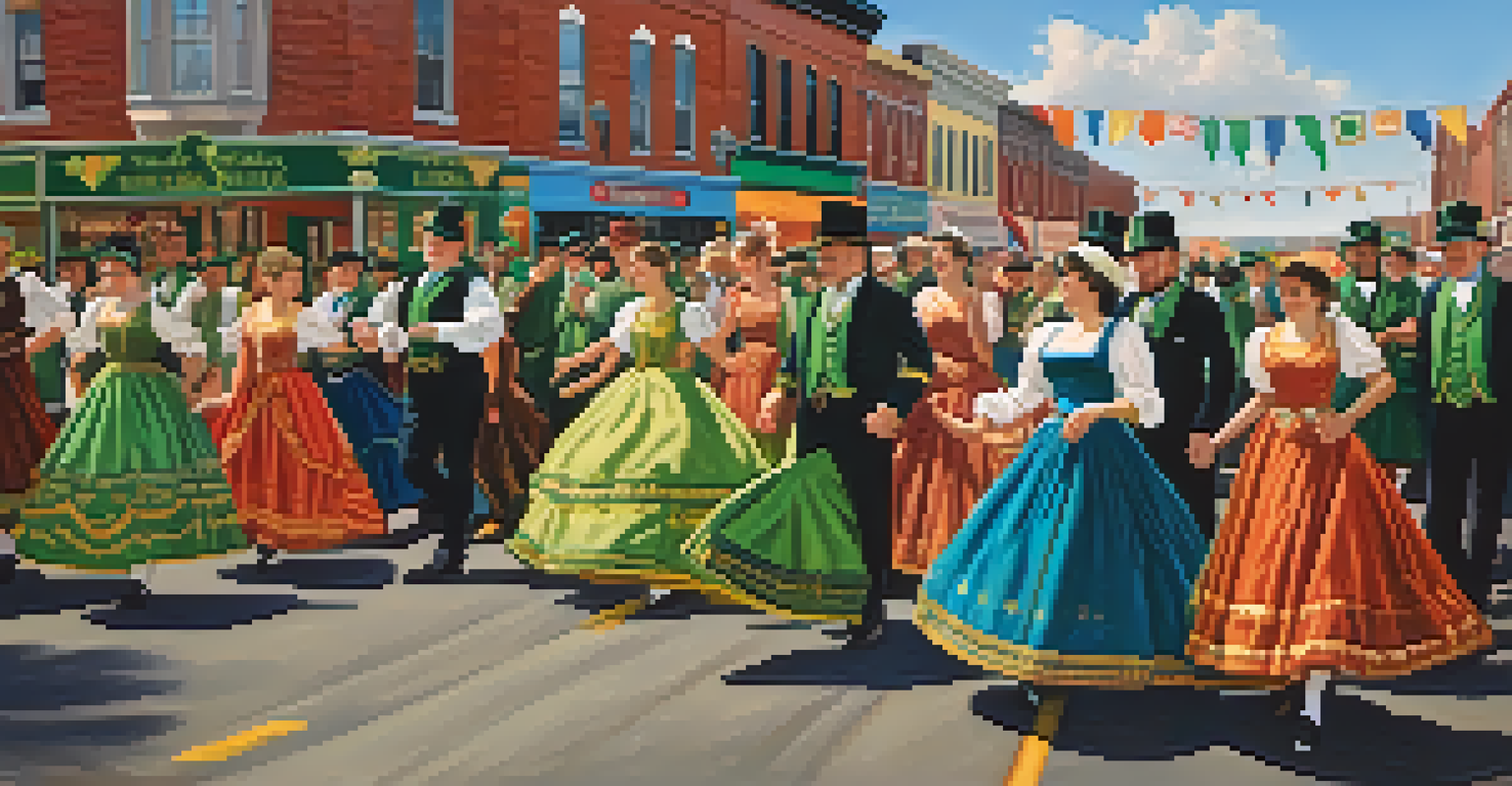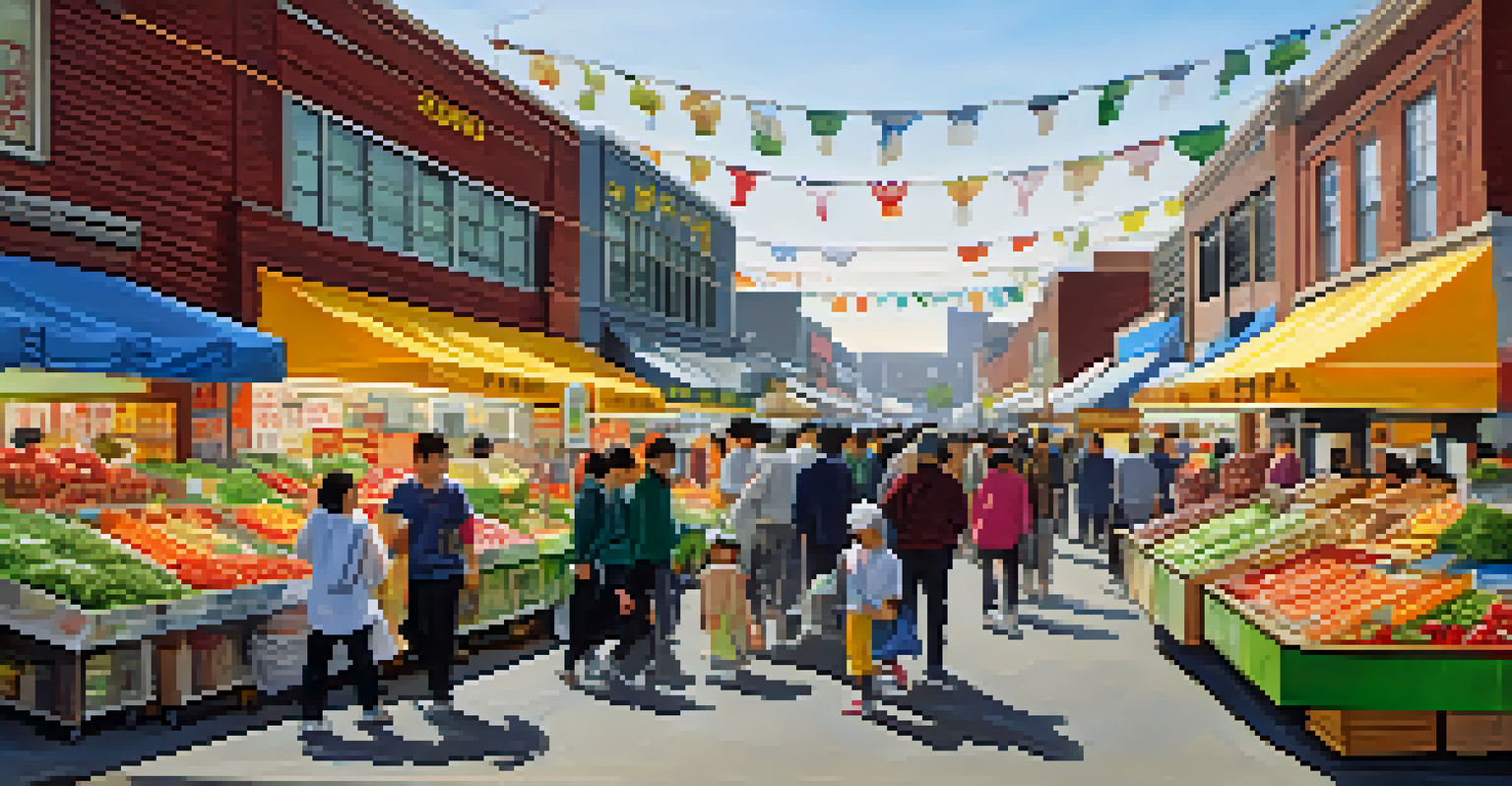Cultural Influences: Immigrants Who Shaped New Jersey's History

The Early Waves: Dutch and English Settlers
In the early 17th century, Dutch and English settlers arrived in what is now New Jersey, bringing with them their customs, languages, and agricultural practices. The Dutch established trade routes and farms along the Hudson and Delaware Rivers, laying the groundwork for economic development. Their influence is still evident today in place names like Hackensack and Bergen.
The strength of a nation derives from the integrity of the home.
The English settlers contributed significantly to the governance and social fabric of the region. They introduced democratic principles and religious tolerance, shaping the political landscape of New Jersey. This early blend of cultures set a precedent for future waves of immigrants to follow.
Together, these groups established a foundation that welcomed diversity and promoted trade, which would attract subsequent immigrant populations. Their legacy is a testament to the idea that collaboration among different cultures can lead to a vibrant community.
The Irish Immigration Surge in the 19th Century
The Irish potato famine in the 1840s prompted a significant influx of Irish immigrants to New Jersey. Seeking refuge and new opportunities, many settled in cities like Newark and Jersey City, where they quickly became a vital part of the labor force. Their hard work helped fuel the industrial growth of the state during this period.

Irish immigrants brought with them rich cultural traditions, including music, dance, and a strong sense of community. They established churches, social clubs, and schools that not only served their community but also contributed to the broader cultural landscape of New Jersey. This helped foster a sense of identity and belonging among immigrants.
Diverse Immigrant Roots in NJ
New Jersey's rich cultural landscape stems from the early contributions of diverse immigrant groups, including Dutch, English, Irish, and Italians.
The impact of Irish culture can be seen today in New Jersey's festive parades, music, and culinary contributions. Their resilience and community spirit laid the groundwork for future generations, proving that immigrant influences are woven into the very fabric of the state's identity.
Italian Immigrants and Their Lasting Impact
In the late 19th and early 20th centuries, a wave of Italian immigrants made their way to New Jersey, particularly in urban areas like Hoboken and Paterson. They brought with them rich culinary traditions, which have significantly influenced the state's food culture. Today, New Jersey is renowned for its Italian cuisine, particularly its pizza and pasta.
Diversity is the one true thing we all have in common. Celebrate it every day.
Beyond food, Italians contributed to the arts and labor movements in New Jersey. Many became involved in building the infrastructure of the state, participating in unions that fought for workers' rights. Their stories of struggle and triumph continue to inspire social movements and community activism.
The Italian-American experience in New Jersey is celebrated through festivals, cultural events, and a strong sense of family. This deep-rooted heritage showcases how immigrant communities can shape and enrich the identity of a state, creating lasting traditions that persist through generations.
Jewish Contributions to New Jersey's Culture
Jewish immigrants began arriving in New Jersey in significant numbers in the late 19th century, fleeing persecution and seeking better opportunities. They established vibrant communities, especially in towns like Newark and Elizabeth, where they opened businesses and synagogues. This not only provided for their families but also enriched the local economies.
The Jewish community brought with them a rich cultural heritage, including traditions in music, art, and literature. They played a key role in the development of public education and social services in New Jersey, emphasizing the importance of community and philanthropy. Their contributions helped to foster an inclusive atmosphere that welcomed diversity.
Cultural Impact of Hispanic Communities
The recent influx of Hispanic and Latino populations has significantly enriched New Jersey's cultural and economic landscape through vibrant traditions and entrepreneurship.
Today, the impact of Jewish culture in New Jersey is evident in its festivals, culinary traditions, and community organizations. Their legacy serves as a reminder of the strength that comes from unity and the importance of preserving cultural identity in a multicultural society.
The Influence of Hispanic and Latino Communities
In recent decades, New Jersey has seen a remarkable increase in Hispanic and Latino populations, enriching the state's cultural landscape. Immigrants from countries like Puerto Rico, the Dominican Republic, and Mexico have made their mark through their vibrant traditions, music, and food. Cities such as Perth Amboy and Elizabeth have become cultural hubs showcasing this diversity.
These communities have significantly influenced New Jersey's economy, contributing to various industries, from agriculture to service sectors. Their entrepreneurial spirit has led to the establishment of numerous businesses, further integrating their culture into the state's economic fabric. This economic contribution is vital to the state's ongoing growth and development.
Hispanic Heritage Month celebrations, cultural festivals, and culinary events are just a few examples of how these communities have shared their rich traditions with others. The blending of cultures continues to shape New Jersey, demonstrating the importance of embracing diversity in fostering a strong and unified society.
Asian American Contributions to New Jersey's Growth
New Jersey's Asian American community has been growing steadily, with significant populations from countries like India, China, and South Korea. This influx has brought a wealth of cultural practices, culinary diversity, and educational values. Towns such as Edison and Fort Lee are now known for their bustling Asian markets and restaurants, which have become beloved staples in the community.
Asian Americans have also made significant contributions to the state’s economy, particularly in technology, healthcare, and education. Their participation in these fields has not only driven innovation but has also enriched the state's workforce. This economic impact highlights the importance of diversity in fostering progress and development.
Preserving Immigrant Narratives
Community organizations play a crucial role in preserving the stories of New Jersey's immigrant communities, ensuring their cultural heritage is respected and celebrated.
Cultural festivals, such as the Lunar New Year celebrations, showcase the richness of Asian heritage in New Jersey. These events not only promote understanding and appreciation among different cultures but also serve as a reminder of the state’s diverse tapestry woven from immigrant stories and experiences.
Preserving Immigrant Stories: Challenges and Triumphs
The stories of immigrants in New Jersey are rich and varied, but they are not without challenges. Many have faced discrimination, economic hardship, and the struggles of assimilation. Yet, through perseverance and resilience, these communities have continued to thrive and contribute to the state's identity.
Community organizations and cultural institutions play a vital role in preserving these immigrant stories. They provide resources and support for newcomers, ensuring that cultural traditions are passed down through generations. This commitment to preserving history is essential for fostering understanding and respect among diverse groups.

As New Jersey continues to evolve, recognizing and celebrating the contributions of its immigrant communities remains crucial. By sharing their stories, we can honor their journeys and acknowledge the profound impact they have made on the state's history and culture, enriching the lives of all who call New Jersey home.